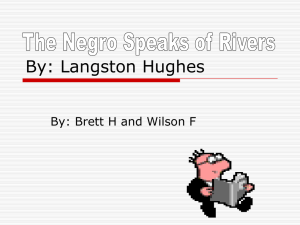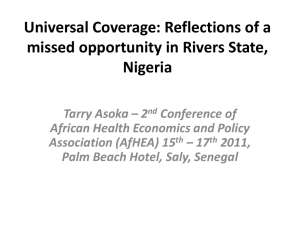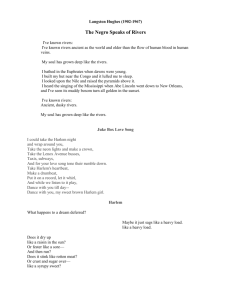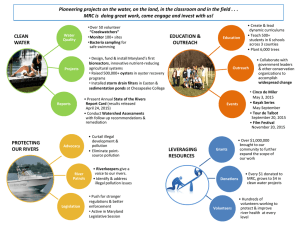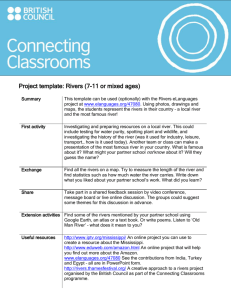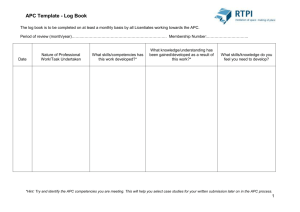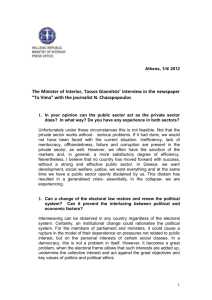Conference Paper by Sofiri Peterside
advertisement
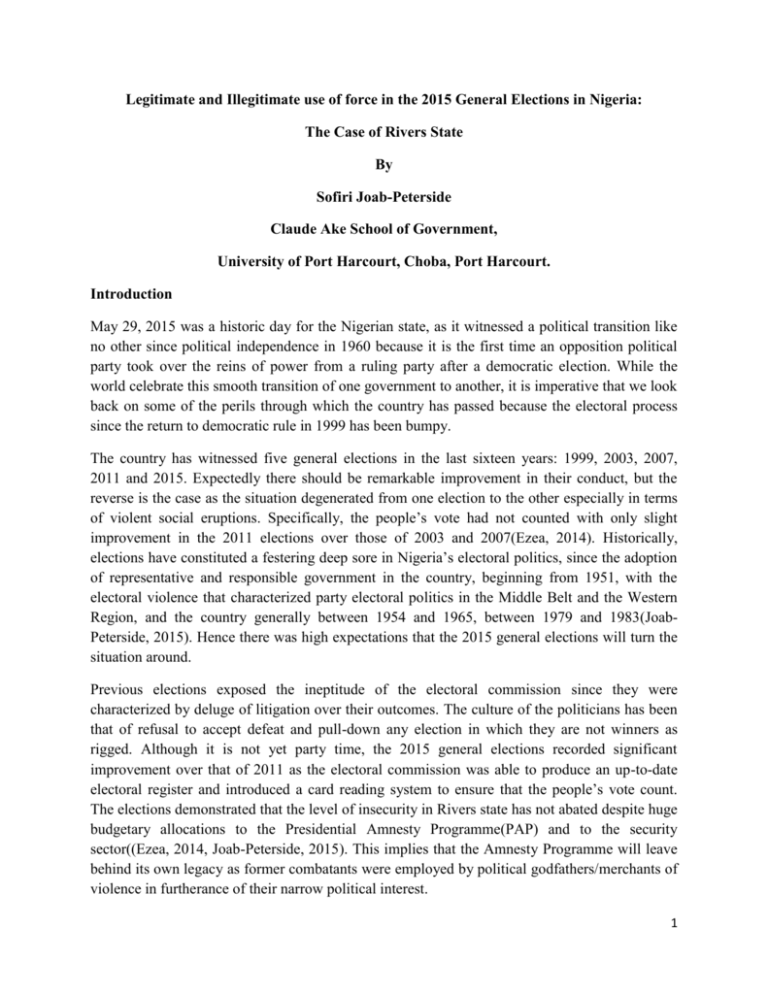
Legitimate and Illegitimate use of force in the 2015 General Elections in Nigeria: The Case of Rivers State By Sofiri Joab-Peterside Claude Ake School of Government, University of Port Harcourt, Choba, Port Harcourt. Introduction May 29, 2015 was a historic day for the Nigerian state, as it witnessed a political transition like no other since political independence in 1960 because it is the first time an opposition political party took over the reins of power from a ruling party after a democratic election. While the world celebrate this smooth transition of one government to another, it is imperative that we look back on some of the perils through which the country has passed because the electoral process since the return to democratic rule in 1999 has been bumpy. The country has witnessed five general elections in the last sixteen years: 1999, 2003, 2007, 2011 and 2015. Expectedly there should be remarkable improvement in their conduct, but the reverse is the case as the situation degenerated from one election to the other especially in terms of violent social eruptions. Specifically, the people’s vote had not counted with only slight improvement in the 2011 elections over those of 2003 and 2007(Ezea, 2014). Historically, elections have constituted a festering deep sore in Nigeria’s electoral politics, since the adoption of representative and responsible government in the country, beginning from 1951, with the electoral violence that characterized party electoral politics in the Middle Belt and the Western Region, and the country generally between 1954 and 1965, between 1979 and 1983(JoabPeterside, 2015). Hence there was high expectations that the 2015 general elections will turn the situation around. Previous elections exposed the ineptitude of the electoral commission since they were characterized by deluge of litigation over their outcomes. The culture of the politicians has been that of refusal to accept defeat and pull-down any election in which they are not winners as rigged. Although it is not yet party time, the 2015 general elections recorded significant improvement over that of 2011 as the electoral commission was able to produce an up-to-date electoral register and introduced a card reading system to ensure that the people’s vote count. The elections demonstrated that the level of insecurity in Rivers state has not abated despite huge budgetary allocations to the Presidential Amnesty Programme(PAP) and to the security sector((Ezea, 2014, Joab-Peterside, 2015). This implies that the Amnesty Programme will leave behind its own legacy as former combatants were employed by political godfathers/merchants of violence in furtherance of their narrow political interest. 1 It is therefore apposite to call attention to the violence which characterized the elections in Rivers state in context in which they represent for me, ominous signs for the future of elections in Nigeria. The elections have ended with many protagonists at loggerheads, parties bitterly disputing the results and conflicts spilling over on the streets and in communities. Cries of fraud are common, especially among losers in tight winner take-all elections. When questions about legitimacy arise, is there reliable evidence that the contests fail to meet the Independent National Electoral Commission’s (INEC) standards? Or are these challenges sour grape attempt to undermine the rightful winners? The conduct and outcome of the elections in the state show that democracy is not without its danger and discontents. The political power base is being reconfigured, creating opportunities for change yet; ethnic and religious cleavages refuse to disappear and may be evolving into major axis of political and social conflicts, while new challenges have arisen. For example, boundaries are shifting. Boundaries may be geographical, social, cultural, religious or economic. There is urgent need to understand how they are created and interpreted because every boundary is an expression and exercise of power and this raises normative issues. First, we peer through the lens of critical analysis which shows how democratic norms are cast aside by citizens and state security forces when parochial interests are at stake. The interests include contests to capture party structures and associated ownership where some political elites became godfathers dictating the pace of party growth and determination of candidates for elective political offices(Bello 2014, Joab-Peterside, 2015).Secondly, we undertake institutional analysis along with selected sociological variables to provide empirical and qualitative support for the primary argument that interests, not norms are the potent criteria for understanding and analyzing the politically motivated violence that characterized the 2015 general elections. Why River State? The political significance of Rivers State in the 2015 general elections and the Goodluck Jonathan’s Presidency derives from the State’s overwhelming support for the Peoples Democratic Party (PDP) in the 2011 Presidential election. In terms of voting strength, Rivers state compares favourably with Bauchi, Benue, Borno, Delta, Niger, Oyo, Plateau and Sokoto states. The voting strength (in context of total number of registered voters for the 2011 Presidential Election) of each of the afore-listed is over 2million. With regard to specific number of registered voters, Oyo state ranked No. 1 with 2, 680, 635 registered voters while Rivers State ranked No. 2 with 2, 473, 419 registered voters out of Nine states (INEC, 2011). With 2, 473, 419 registered voters for the 2011 Presidential Election, the State ranked No. 6 out of the 36 states in terms of overall voting strength. Similarly, Rivers State ranked number one in the South-South Geo-Political Zone in terms of voting strength. It is therefore not a surprise that the face-off between Governor Rotimi Amaechi and the national leadership of the PDP which resulted in defection of Governor Amaechi and his supporters to the then opposition All 2 Progressive Congress (APC) was a cause of concern for Rivers people because it stands the state at the crossroads of contemporary Nigerian politics particularly, the 2015 general elections. It is pertinent to note that the state did not only emerge as one of the leading States in terms of the number of registered voters but it also emerged as the State that turned in the highest number of votes for PDP in the 2011 Presidential Election. For example, Rivers State turned in 1, 817, 766 votes for the President, Delta State: 1, 378; Abia State : 1, 175, 984; Akwa Ibom State: 1, 165, 629; Anambra State : 1, 145, 169; Kaduna State: 1, 190, 170 and Plateau: 1, 029, 865(INEC, 2011). The state also ranked number one in the South-South Region in respect of the total number of votes casted for the President in the 2011 Presidential election. For instance, the total number of votes casted for the President in Rivers State in the 2011 Presidential election amounted to 1, 817, 766, Akwa Ibom State turned in 1, 165, 629 votes for the President; Bayelsa State: 505, 811; Cross River State : 709, 382; Delta State : 1, 378, 851; while Edo State turned in 542, 173 votes(INEC, 2011). Then Action Congress of Nigeria(ACN) polled 16, 382 votes, while the Congress for Progressive Change(CPC) and Hope Democratic Party with a Presidential candidate from Rivers State polled 13, 182 and 319 votes respectively(INEC, 2011). The implication that flows from the above data is that Rivers state is overwhelmingly a PDP state with a political history of aliening or partnering with mainstream political party. However, the defection of Rotimi Amaechi to the APC was an indication that the 2015 general elections will not be a tea party or business as usual as Governor Amaechi was determined to give his best fight with attendant consequences for the Presidential and Gubernatorial elections. Thus, there was palpable fear within the PDP that unless something urgent happens and very soon too, the electoral fortune of the President in particular and the party in general, will be adversely affected. In the next section, we present a synopsis of several factors that culminated in the use of legitimate and illegitimate force in the general elections. These factors revolve around identity politics, institutional conspiracy, attitude of the political elite and the citizenry, security officials and civil society organizations, especially in electoral process administration, and locating the place of electioneering campaigns within this broader and seamless canvas of electoral politics. The Road to Violence The rumbling in the state generated a deep sense of anomie and desperation of the political elite to either capture or maintain their grip on power. Most Rivers citizens hold the view that the last general elections will go down as the most anxiety-ridden pre-election and election periods in the history of the state. The politicians failed to behave responsibly; vote-buying was used to mobilize parties’ own strongholds while the two leading political parties also targeted votebuying and threats towards specific ethnic groups and areas, potentially to weaken the support base of their political rivals. 3 The electioneering campaigns were not issue based as leading political parties failed to provide the electorate clear policies and programme directions. Apart from launching of sketchy roadmaps, the expected follow up collage of concrete directions of the parties did not materialized, while the campaign tactics of the two dominant political parties were characterized by desperateness portending implications of epochal proportions. The APC propaganda machine was up to the task as epitomized by ceaseless and virulent critique of President Jonathan’s administration on a range of issues that left the government’s information managers scrambling for appropriate responses on many occasions (Ajanaku, 2014). The arrowhead of the APC propaganda machine Lai Mohammed presented Governor Amaechi as a victim of Presidential harassment for protesting: the ceding of Rivers oil wells to Bayelsa state; intervention of the First Lady (Mrs. Patience Goodluck Jonathan) in Rivers politics; support of Nyesom Wike’s bid to take over the PDP administrative machinery by the Presidency; and deployment of unfriendly Police Commissioner to the state to execute what was termed “Abuja Agenda”. The PDP on the other hand, projected Governor Amaechi as arrogant; disrespectful to elders of the state and and treating of the office of the President with disdain. The APC’s strategies tapped into the sentiments around power returning to the North which felt shortchanged that the pendulum swung to the South-South which taste of the presidency was under President Jonathan. Consequently, Governor Amaechi’s determination to foist a new political map on the state met with resistance by a segment of the population. What began as battle for the control of PDP in readiness for 2015 general elections eventually resulted in utterances and actions that destroyed and consumed some citizens. Lack of internal party democracy is one of the challenges of democratic consolidation in the country because of the mutual interaction of the political parties with their environment, which primarily defines parties, their structure and functions. For example, whether parties are national in outlook and spread, embrace internal organization or democracy as well as recognition and registration by an electoral body. The point being made is that the party system has been influenced or shaped by its developmental trajectory. Consequently any useful analysis of political parties must be situated in the broader context of the interplay of material and social forces in Nigeria. These forces include changes in the country’s social structure especially the rise initially of educated elite, military/business class and the interplay of ethnicity, as the most salient cross-cutting aspect of Nigeria’s social structure, and the political architecture of its federalism (Jinadu, 2007). The 2015 elections underscores the fact that ethnicity is a major element of Nigeria’s social structure. It has unquestionably had and continues to have profound impact on the origins and developmental trajectory of party politics in Nigeria, and the practice of federalism in the country. Although efforts have been made to discourage formation of ethnic based parties in order to de-emphasize the dysfunctional or centrifugal salience of party politics through militarybrokered transitions that tried to proscribe or discouraged the formation of ethnic based political 4 parties, facts at the disposal of the paper revealed that reforms of the party system under military brokered democratic transitions have neither removed the salience of the ethnic factor as an issue in Nigerian politics, although they may have domesticated it within the political parties nor brought about internal democracy within the parties(Nwankwo, 1990, Jinadu, 2007). The failure of the leading political parties in the state to faithfully subscribe to rules and regulations intended to ensure internal party democracy within them have had negative and destabilizing spillover effects on the polity, resulted in violence, and constrict irredeemably the democratic space. The conduct of party primaries for elective public political offices by the political parties and the creeping centralization of party political processes have tended to undermine decentralized mechanisms and structures to ensure accountability and participation within the parties. In addition to the leading political parties adopting illegal electioneering strategies, the state judiciary was incrassated by politically motivated succession crisis. This was the general pattern hence, harbinger of violence that imploded and undermined political contestation process or eroded conduct of free and fair election in Rivers State. Related to the absence of internal party democracy is the question of internal party discipline and lines of accountability especially in defining the relationship between the party-outside-thelegislature, and the party-within-the legislature, particularly in a presidential system, where party discipline within the legislature tends to be weaker than in a parliamentary system. This phenomenon is a spillover from the centre where some governors and other bigwigs of PDP were battling President Jonathan over control of the party structure to truncate his second term bid. The climax of the PDP crisis at the centre was the defection of sitting PDP governors with some political heavy weight like former Vice-President Atiku Abubakar to the APC having failed to wrest control of the party structure to truncate the second-term bid of President Jonathan in the belief that his quest to take political control of the country may be hampered within PDP than from outside (Akure, 2014). At the State level, Governor Amaechi was slogging it out with Chief Nyesom Wike. An Abuja High Court order given on 15th April 2013 by Justice Isiaq Bello against Governor Amaechi and his supporters set the stage for his exist from the PDP (JoabPeterside, 2015). On April 29, 2013 the new State Working Committee (SWC) led by Felix Obuah suspended 27 out of the 32 members of the Rivers State House of Assembly, including the Speaker, His Deputy, the House Leader, Deputy House Leader and Deputy Chief Whip for failing to rescind the dissolution of Obio/Akpor Local Government Council; while their matter was referred to the disciplinary committee of the party in the State for further action. Only five lawmakers escape the wrath of the SWC. These are Evans Bipi(Ogu Bolo Constituency), Victor Ihunwo(Phalga Constituency111), Kelechi Nwaogu(Omuma Constituency), Martins Amaehule(Obio/Akpor Constituency 1), and Michael Chinda(Obio/Akpor Constituency 11). The defection of Governor Amaechi and a great majority of his supporters claimed the political life of some cabinet members of the Amaechi Government since the Governor defected from PDP to APC. For example, the Rivers State Special Adviser on Flood Control Hon. Obinna 5 Anyanwu resigned because of the Anti-Amaechi position of his father-Prince Emmanuel Anyanwu; Commissioner for Urban Development, Dr. Tammy Wenike Danagogo(former Minister for Sports); River State Commissioner for Housing, Marshall Stanley Uwom also resigned his appointment. The Rivers State Local Government Service Commissioner, Chief Azubuike Nmerukini was said to have been forced to resign his position as the Chairman of Rivers State Local Government Service Commission in January 2014 as a result of his refusal to defect to the APC with the Governor (Joab-Peterside, 2015). Legitimate and illegitimate use of force The Weberian notion of violence that runs deep in Western political theory: the distinction between violence performed on the part of a state (especially against its own population) seen as at least potentially legitimate (even if the legitimacy may be contested in certain circumstances), and violent acts carried out by non-state actors such as rebel groups (Leonard, 2005). In many African circumstances however, this distinction is hard to sustain. The distinction between state and non-state actors collapses when “rebel groups” are supported by neighbouring states. This cause us to question the applicability of the Weberian distinction between legitimate use of force by established states and the illegitimate use of force by non-state actors against the interest of the federal government. Against this backdrop, our aim here is to demonstrate the complicity of the state or its security forces in provisioning and legitimization of illegitimate use of force. The threatening character of the federal government resulted in the renewal of primordial identities and defence against the incursion of coercive federal power via state security forces and competition among the citizens and communities to access both federal and state power, and if possible capture it, competition to capture political power is dialectically related to competition to capture economic resources and opportunities for local empowerment. The cultivation by groups of identities and solidarities, manoeuvres for forms of exclusivity by which political elites of particular groups and communities represent attempts to disable or disenfranchise potential competitors (Ake, 1997). Threatened with violence by state security forces which is perceived as legitimate, and in context of deep-seated social cleavages, the absence of an objective force to mediate conflict, people tendentially retreat to their primary groups which become the beneficiary of their residual loyalty, hence they resort to self help readily provided by non-state armed groups. Often times, the non-state armed groups provisioning of illegitimate force is legitimatized by state security forces tolerance of illegitimate use of force. Paradoxically, democracy offers the rule of law, accountability and immunity from arbitrary power which are elements needed to banish the insecurity spawned by aggressive state power (Ake, 1997). It is apposite at this juncture to provide evidence of incumbents’ manipulation of state security forces and electoral officials to work for their re-election or election of their political surrogates at all costs against the popular vote or wishes of Rivers citizens. For our purpose, violence 6 perpetrated by state security forces are perceived as legitimate since they have constitutional support for bearing arms(leaving aside the contested nature of use of the coercive apparatus of the state) , while violence deriving from non-state actors are conceived as illegitimate use of forces. Although this distinction in some cases tended to be blurred, it suits our purpose. Rivers State witnessed a bloody political battle between two frontline political parties in the state, the Peoples Democratic Party (PDP) and All Progressive Congress (APC) over supremacy and control of the state. One of the first victims of the crisis was an anti-Governor Amaechi law maker, Mr. Michael Okechukwu Chindah, who was hit hard with a mace by the Leader of Rivers State House of Assembly, Hon. Chidi Lioyd, during a brawl on the floor of the House on July 9, 2013. Chindah sustained serious injury on the head that left him unconscious before being rushed for care at a private hospital in Port Harcourt. He was later rushed to a London hospital for advanced medical treatment. The disruption of a Pro-Amaechi rally organized by the Save Rivers Movement (SRM) in Port Harcourt by the police was another unfortunate episode in the politics of intolerance and bitterness that characterized political contestations in the state. The alleged shooting of Senator Magnus Abe attracted a protest by some Ogoni youths ten(10) of who were arrested and charged to court for conspiracy, unlawful gathering and possession of dangerous weapons, and illegal possession of walkie-talkie(The Guardian, Saturday, January 18, 2014: 49, 51, The Guardian, Tuesday, January 21, 2014:6). Also, in January 2014, two court houses in Ahoada were bombed and sensitive documents destroyed; the secretariat of the state chapter of the Nigerian Bar Association (NBA) located in the building of the Ahoada High Court suffered damage (The Guardian, Friday, January 17, 2014). In November 2013, armed security forces invaded Omuma Local Government Secretariat in a bid to pave the way for members of the then supervising Minster of Education Pro-Nyesom Wike’s political group, Grassroots Democratic Initiative(GDI) to launch their chapter there. In the month of December 2013, the police invaded the headquarters of Ikwerre Local Government Area at Isiokpo, and used teargas to disperse the supporters of the APC who had gathered to sensitize and rally support for the party. Also in the same month, policemen used teargas to disperse teachers newly recruited by the Rivers State government who had converged at the Liberation stadium, Elikahia, Port Harcourt, to pick up their posting letters. The police alleged that the teachers had been mobilized to protest against the administration of President Jonathan (The Guardian, January 19, 2014). The people of Rumuigbo and Rumuipirikon in Obio/Akpor Local Government Area of Rivers State witnessed a sample of what is to come in the 2015 general elections if proper security measures and caution are not taken by security operatives to contain the politicians. The people of both communities woke up to shootings and destruction of property as a result of a political battle between the PDP and APC fighting over control of the area. The fracas started when some PDP members claimed to be in charge of the area challenged that Governor Amaechi cannot visit 7 the area, while the APC members insisted that the Governor as the number one citizen of the state who is also the leader of APC in the state must visit the area, unknown to them that the visit had been cancelled following the demise of Port Harcourt City Local Government Area CareTaker Committee Chairman. Properties of members of the two leading political parties were destroyed. On January 11, 2015 the APC secretariat in Okrika council Area was attacked and on January 25, 2015 gunmen stormed the venue of APC meeting destroying vehicles, assaulting people and preventing the rally from holding(The Guardian, Friday, March 13, 2015:16). Similarly, in March 2015, the All Progressive Congress (APC) raised an alarm alleging killing of its members and supporters in the state as the elections draw near. The statement stated that nine of its members were killed in two separate incidents along the D-Line axis and the Eastern Bypass in the Marine Base area of Port Harcourt. There were also ceaseless attacks on APC supporters in the Okrika Council Area where the opposition had been victims of three bomb attacks (Abuh, 2015). In the same month, the eruption of violence with its trail of explosions and gun shots marred the All Progressive Congress (APC) gubernatorial campaign in Okrika. In the attacks, said to have been unleashed by political thugs on fifty (50) persons among them, four policemen and journalists were injured and a policeman killed as thousands of people scampered for safety. What makes the Okrika violence peculiar are its frequency and the characters represented by the parties in the battle for the soul of the community. The seeming inability of the police to respond to these attacks was captured by the Editorial of The Guardian Newspaper thus: Before this latest spate of violence, providing security for the APC rally by the police had been a matter of concern for its high command as if it were hamstrung to carry out its constitutional duty of protecting lives and property. When the APC had concluded plans to organize a rally for early February, the Rivers State Commissioner of Police, Mr. Dan Bature, had even counseled for a change of date to enable the police provide adequate security(The Guardian, Friday, March 13, 2015:16). Security concern ahead of the governorship election was heightened by the killings and attacks on party members in three communities in the state. Specifically gunmen stormed the residence of Christopher Adube in Ogba/Egbema/Ndoni Local Government Area killing him, his two sons, and a brother on a visit. The gunmen later invaded the APC secretariat at Obrikom and vandalized it. From there the gun men moved to Obor, a neighbouring community and killed a security man at the residence of Mr. Vincent Ogbagu, a former councilor and set the building ablaze. On March15, 2015 two leaders of the Peoples Democratic Party(PDP) in the state, Mr. Ibima Olunta(Chairman, Ward 3 Abonnema) and Mr. Goodfellow Bobmanuel(councillorship aspirant, Ward 2, Abonnema) in Akuku-Toru Local Government Area were shot dead. The PDP alleged 8 that APC supporters shot the two men, as they sat in front of their houses in Abonnema(Godwin, 2015). The point being made is that Rivers state witnessed unprecedented political violence epitomized by an unusual increase in deaths as well as gunshots and matched injuries. Statistics from the office of the Commissioner of Health Dr. Sampson Parker, revealed that the Braithwaite memorial Hospital (BMSH) and the Kelsey Harrison Hospital, from January to 12 March, 2015, recorded 41 gunshot wounds and 26 machete cuts. This is besides cases that may have been handled by private hospitals across the state. The figure does not include persons who died on the spot or days later, and who were taken to a morgue rather than a hospital (Godwin, 2015). The gubernatorial election in Rivers State was also trailed by violence with six persons killed. Besides reports of killings, there were also cases of arson, attacks on Independent National Electoral Commission (INEC) officials and hijacking of electoral materials. For example, the INEC office in Buguma, headquarter of Asari-Toru Local Government Council and the house of the Rivers State commissioner for Women Affairs were attacked and set ablaze; as a result, seven vehicles transporting electoral materials were burn (Abuh, 2015). Although some of the violence erupted simultaneously as a result of the belief that the election is being or had been rigged, there were also premeditated attacks involving politicians who enlisted criminal gangs and ex-militants even before the actual election especially in Okrika, Gokana, Tai, Akuku-Toru and Ogba-Egbema-Ndoni Local Government Ares of Rivers State. It is important to note that widespread availability of small arms and light weapons in the state exacerbated violence. The Role of Ethnic and Social Movements Ethnic and social movements invigorated local politics and heightened tension due to their recognition and in some cases, informally included in the political parties. These movements offer unique capacity to mobilize social capital for democratic ends and forge consensus on political agenda/projects. They are expanding public expectations of democracy by insisting on greater participation, the reduction of perceived inequality, and the protection of collective rights. Political parties relying on ethnic affiliations focused their courting efforts on their supporters to achieve what Nitcher(2008) defines as “turnout-buying”. However, in some cases, fewer resources are devoted to ethnic groups whose votes were already perceived as guaranteed. Two social movements were prominent in the elections namely the Save Rivers Movement (SRM) and Grassroots Democratic Initiative (GDI). SRM formed by Senator Magnus to garner support for his gubernatorial ambition was pro-Amaechi, while GDI is a pro-Nyesom Wike established in support of his governorship bid. A member of PDP who spoke to me on condition of anonymity captured the influence of pro-Wike social movement in PDP in the following words: “The Minister of State for Education had deceitfully presented the GDI as the vanguard for the struggle to liberate the PDP and Rivers people from the stranglehold of Governor Amaechi’s 9 dictatorship and the governor’s treacherous attacks on the Presidency. This attracted massive and wholehearted support for the activities of GDI. However, subsequent events have shown that the formation of GDI was aimed at keeping the Rivers PDP dormant until it becomes too late for anybody to challenge the hidden agenda of Felix Obuah and his cohorts” The point of fact is that both movements at different times enjoyed state security forces patronage and when subjugated by state security forces resorted to self-help. This situation bespeaks partisan interest of state security forces as they become tools of political suppression and intimidation. There is a traditional feeling and persuasive argument that the governorship of the state should be shared between what has become known as “Upland/Riverine” divide irrespective of Senatorial Districts. Although Governor Peter Odili and Rotimi Amaechi are from different senatorial districts, they are perceived as upland persons. Consequently, the riverines communities were opposed to the candidature of any upland politician notwithstanding his \ her political party. However, the Ogonis contended that they laid the foundation of what turned out to be South-South or Niger Delta Presidency due to their non-violent struggle for political, fiscal and environmental justice which culminated in the extra-judicial execution of the Ogoni 9, including Ken Saro-Wiwa. Against this background, the Ogonis through their umbrella organization- the Movement for the Survival of Ogoni People (MOSOP) insisted that it is only fair for them to produce the governor of Rivers State in 2015. Despite this forceful and logical argument, there was a wide held perception that it is turn of the riverine, especially the Ijaws to produce the Governor. The APC latched on to this perception and presented a none-Ikwerre governorship candidate for the 2015 gubernatorial election. Rufus Ada George, a native of Okrika was Rivers state Governor from 1992 to 1993. Dr. Peter Odili was Governor from 1999-2007; Celestine Omeha from 2007 to 2008; and Governor Rotimi Amaechi from 2008 to 2015. Governor Nyesom Wike who contested on PDP ticket is from Obio/Akpor Local Government Council and like Governor Amaechi, is of Ikwerre Ethnic Nationality and from Rivers West Senatorial District. This identity politics was another tread in the 2015 election in the state because the chances of political parties relying on violence increases in areas where they have less electoral support. The aim here is to deter people from voting for their rivals. Institutional and Citizens’ Conspiracy There were glaring cases of failure of regulatory institutions to the extent that political choices were made long before the elections contributing to political violence. Some occupants of these institutions (Independent National Electoral Commission (INEC), the Police, and Political Parties) saw the elections as an opportunity to sell their services to the politicians. For officers of state institutions, monetary payment is the reward, while party officials received monetary payments or promised of jobs and post within the new government. 10 Consequently the high level of violence and serious cases of electoral fraud occurred in some cases with the active connivance of security agents as they maintained passive dispositions in the face of clear breaches of electoral procedures. There were also cases of harassment and intimidation of some journalists. There were instances of conspiracy perpetrated by friends and associates of politicians chosen as party agents in collaboration with members of rival political parties to pave way for preferred candidates. Even when the ordinary people knew that the election was not free and fair, they looked the way because they were united in their protection of parochial interests. The feeling of complicity of security agents in the violence and fraud that characterized the elections was high. For instance, in February, 2015, the Inspector General of Police (IGP) in response to the shooting that disrupted the All Progressive Congress (APC) governorship campaign in Okrika ordered full scale investigation into the incident. Interestingly the report of the investigation is yet to be made public. The Police and other State security forces to a large extent failed in their constitutional responsibility to the citizens, thereby giving a leeway for individual and/ groups to dictate and threaten the rights of others without regard to either the police or state security forces. This state of security forces inaction contributed immensely to the degeneration into violence which culminated in killing of one of their own amongst many others. Institutional conspiracy is oiled by clientelistics networks because of the vast array of political appointments( legislative, and executive) and private staff positions to be filled is a veritable boom to prebendal politics. Opportunities for access to the state are multiplied as political appointees and their clients enjoy new leverages to procure preferential treatments. Prebendalism is encouraged by the existence of patronage system in which an individual/individuals of highersocio economic status(patron) uses his or their influence and resources to provide protection or benefits or both, for a person of lower status(client) who for his/their part, reciprocate(s) by offering general support and assistance, including personal services(Joseph, 1991, JoabPeterside, 2012).It is therefore not a surprise that elections induced violence because market forces determine the voters behavior. Under this circumstance what emerges is a set of stimulated outcomes in which votes did not count or worst still, votes were not even counted. The media occupies a unique place in the struggle for democratization of the Nigerian State. Its watch dog role has often times pitched it against the ruling elite. This should not be a surprise because the institution has a moral obligation and role in combating injustice and social ills. Consequently, it is expected to safeguard and advance the course of human rights and democratic consolidation. This implies that the media should investigate and expose situations likely to obstruct a credible electoral process. However, prevailing economic climate or work environment has negatively affected the effectiveness of the media. Journalists of reputable organizations are known to have been owed their very low remuneration; victims of frequent job changes or turnover all of which affect the viability of the media. Major fallout from this situation is corruption and decline of professionalism as journalist are now public relations consultants not out of choice but as survival strategies. Such practices have contributed to either 11 under coverage or un-objective coverage of the electoral processes. Part of the problem derives from the geographic location/concentration of media institutions a situation that resulted in what has been termed an institutional and locational monopoly that possesses the mindset of its locality. Journalists differ in their activity levels. Some are significant initiators of news content, while others take cues largely from other actors in the media institutions. Journalists also vary in ideological fervor. Some are detached from the environment they report, while others are advocates for various courses and interests. Often times only those who represent power by virtue of their office or the material resources they command are given preference in publicizing or airing of issues. In the end, what becomes news is the professionals’ choice often determined by criteria that have little or nothing to do with the significance of the story. Unregulated electioneering campaigns due to the ineptitude of relevant regulatory agencies added fuel to acceleration of electoral violence on a larger and more decimating scale. It is necessary to channel electioneering campaign away from their historic disruptive role in the electoral process, to more functional and supportive role for the democratic process and its consolidation in the country. Well defined rules are essential for conduct of free and fair elections because they create and maintain a level field for all players and give them confidence that win or lose all will remain secure in their rights and able to contest again. But conspiracy of institutions has shown that formal rules can be abused with impunity or used selectively, often for private interests. The short-term outcomes of such actions may even be desirable; the long-term results, however, are likely to be harmful. Conclusion Nigeria’s experience shows that democracy especially its electoral component is not without danger. One way we can try to protect citizens against violent political contestation processes is by always coupling democracy with human rights and internal measures that divide and check power. The democratic process tends to promote intolerance hence turn the opposition into enemies. The specter that will hunt a regime that emerged from violence is bad governance that will serve the interest of narrow ruling elite. Governance will be drenched in corruption, patronage, favouritism and abuse of power unable to reduce inequality and unemployment because of its tendency to recoup resources spent to capture power. Endemic corruption is not a flaw that can be corrected with a technical fix or a political push, because it is systemic- deeply embedded in the norms and expectations of political and social life. Reducing it to less destructive levels-and keeping it there requires radical change in institutions. 12 The implication that flows from the above is that the road to violence free election in Rivers state involves a long, exasperating journey, through difficult, treacherous, winding and in some respects, uncharted or unnavigated terrain. Yet it is important that the citizens must persevere on the journey to it because political violence is the leeway for automatic ticket seekers in a defiled polity. If we must reach it, the political elites and political parties must take the lead by showing a demonstrable commitment to play by the rules thereby constitute themselves into a force for advancing democratic consolidation in Nigeria. 13 References Abuh, A., 2015. APC raises the alarm on suspected killer squard targeting opposition, Thursday, March12, 2015: 7. Abuh, A., 2015. Rights Groups alleges complicity of security agents in Rivers State violenceothers, The Guardian, Monday, April 13, 2015:6. Agi, F. 2015. Tragedy As Courts Re-Open In Rivers, THE BEACON, Tuesday, February 3-9, Ajanaku, A. 2014, APC And The Challenge In 2015, The Guardian, Sunday, June 1, 2014: 1821. Ake, 1997, Why Humanitarian Emergencies Occur, insight from Interface of State, Democracy and Civil Society, The United nations University, World Institute for Development Economic Research(Research for Action 31). Helsiniki, Finland. Akhaine, S., and Ebiri, K. , 2014. Anxiety over planned anti-Amaechi protest, The GURADIAN, Tuesday, January 21, 2014: 6. Akure, N. B., 2014, All Now set for The APC Power Game, The Guardian, Sunday, June 1, 2014: Bello, N., 2015, Election As Albatross of Nigeria Politics (1), The Guardian, Sunday, February 15, 2015:18. Chinda, S. 2014. Rivers Guber: Obio/Akpor Soaked in Blood. The Hard Truth, August 1420:11. Chinda, S. 2014. Etche Residents Flee Homes over Shooting, The Hard Truth, August 21-27:7. Cook, P. and Ludwig, J. 2000b. Economic and Development Costs of Firearms Violence. Background Paper. Geneva: Small Arms Survey. Ebiri, K. , 2014. The Long Battle for The Heart of Rivers, The GUARDIAN, Saturday, January 18, 2014: 49-51. Ebiri, K. , 2014. Rivers: Theatre of Crisis in A Democracy, The GUARDIAN, Sunday, January 19, 2014:24. Ebiri, K. , 2014. Ex-Warlords and Their New Pastimes, The GUARDIAN, Special Report, Sunday, May 4, 2014: 26-29. Ebiri, K. 2014. Tension in Rivers PDP over Wike’s ambition, The Guardian, Friday May 2:11. Ezea, S., 2014. The Journey, the Destination, the Travail, the Triumphs, The Guardian, The Guardian, Tuesday, May 29, 2014: 12-18. Ebiri, K. 2015, Ateke Tom, Others Caution Parties against rallies in Okrika, The Guardian, Wednesday February 25, 2015:6. 14 Editorial: On threats of war, Friday, The Guardian, February 13. Editorial, 2015. No to Pre-election Violence, The Guardian, Friday March 13, 2015: 16. Editorial, 2015. Elections Nigeria must win, The Guardian, Thursday, March 26, 2015: 18. Godwin, A. 2015. When Nigerians held Breath, Chose Leaders, The Guardian, Sunday April 5, 2015: 8. Independent National Electoral Commission (INEC), 2011, Result of 2011 Presidential Election, Abuja. Jega, A. and Ibeanu, O., 2007. Introduction: Elections and Paroxysmal Future of Democracy in Nigeria. Elections and The Future of Democracy in Nigeria. A publication of the Nigerian Political Science Association. Jinadu, L. A. 2007. Party System and Democratic Consolidation in Nigeria: The Challenge For The Peoples Democratic Party. Paper presented at the retreat for PDP candidates for federal and state elective public political offices, held at the International Conference Centre, Abuja, January 8-10, 2007. Joab-Peterside, S., 2005. On the Militarization of Nigeria’s Niger Delta: The Genesis of Ethnic Militia in Rivers State, African Conflict Profile, Journal of the Centre for Ethnic and Conflict Studies(CENTECS) University of Port Harcourt, Vol. 1. No. 2 OCT. 2005. Joab-Peterside, S., 2012. Corruption Issues in the Federal Government’s Amnesty Programme for Ex-Militants in the Niger Delta, State and Society, Volume 2 No. 1 November 2012, An Interdisciplinary Journal of the Nigerian Sociological Society. Joab-Peterside, S. 2015 Politics and Militancy, Conflict and Development in the Niger DeltaSociological Perspectives, Mark Anikpo(ed), ABIC Books, Enugu. Joseph, R. A. 1991. Democracy and Prebendal Politics in Nigeria: The Rise and Fall of the Second Republic. Spectrum Book Limited, Ibadan-Lagos. Leopold, M., 2005. Review Article: Violence in Contemporary Africa Reassessed, African Affairs, Oxford University Press on behalf of Royal African Society. Nitcher, S. 2008. Vote Buying or Turnout Buying? Machine Politics and the Secret Ballot. American Political Science Review 102: 19-31. Nwankwo, A. A. 1990. Retreat of Power- The Military in Nigeria’s Third Republic, Fourth Dimension Publishers, Enugu. The Hard Truth, 2014. Rivers Guber: More Blood Bath Looms, August 21-29, Ughegbe, L., 2015. Pre-Election Violence Claim 59 Lives Nationwide, The GUARDIAN, Saturday, February 14, 2015:2. Williams, A. 2015. Rivers Overtakes Wild Wild West, The Guardian, Sunday March 1, 2015:10. 15
